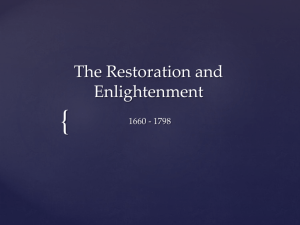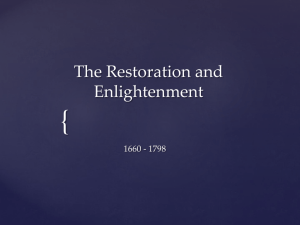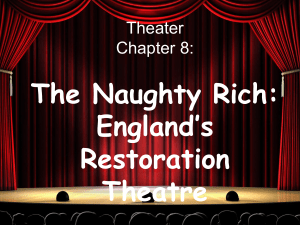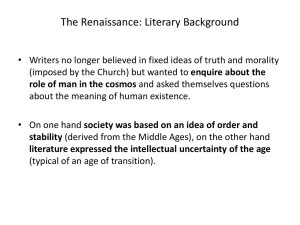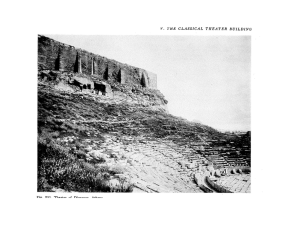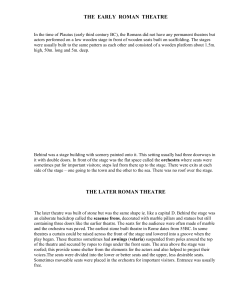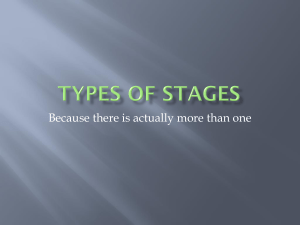Restoration Theatre
advertisement
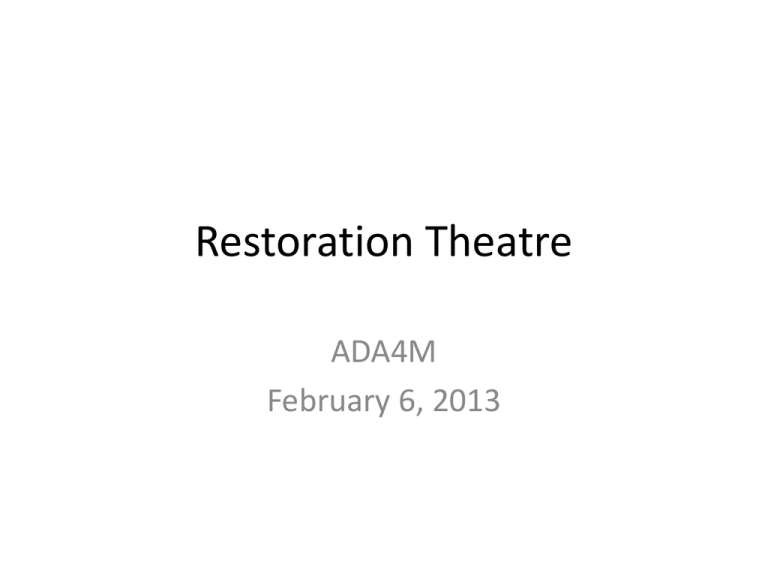
Restoration Theatre ADA4M February 6, 2013 Monarchs and Their Fancy Titles • Elizabeth I: Elizabethan period – 1558-1603 • James I: Jacobean period – 1603-1625 • Charles I & II: Carolinian period – 1625-1649 – 1660-1685 Remember… • After the enormous success of Renaissance theatre (Shakespeare’s time), the theatres were closed in 1642 by Puritans. Why? Civil War • English Civil War: 1642-1649/51 • Parliamentarians vs. Royalists • Parliamentarians: wanted a government with all the power in the parliament • Royalists: Supported King Charles I (and later Charles II), wanted England to remain a monarchy Events of the War • War begins in 1642. Puritans (on the Parliamentarian side) close theatres (and many other forms of entertainment) • Struggle and strife for many years • 1649: Charles I loses the war. He is captured. – First time a King is tried at court – Convicted of high treason – Executed So, the king is dead… • Oliver Cromwell runs the Parliament and leads Britain as a republic (a nation without a king) • Cromwell dies, his son takes over • Meanwhile, Scotland is not so happy with things… • More conflict between the two sides, eventually Charles II declared the rightful king of England • 1660: Monarchy restored (hence Restoration period) Because they could… • When the Royalists returned, they wanted to show off their success to the Parliamentarians • Oliver Cromwell’s body dug up and beheaded, and his head put on a spike Weren’t We Talking About Theatre? • Charles II restored a more lavish lifestyle, brought back celebration, opulence, and fashion as central parts of the upper class’s lives • Licensed 2 acting companies • Changed laws about who was allowed to act The Royal Theatres • Elaborate stages with royal patents (e.g. Theatre Royal, Drury Lane, designed by Christopher Wren) • Moveable scenery, machines for “high-tech” special effects (e.g. lightning, waves) The Audience • Much like in the Renaissance, Restoration audience were composed of all sorts: upper classes, their servants, and the middle class – Note: there is a middle class now! • Samuel Pepys’ diary: famous diary of a man who recorded his experiences at the time, often wrote about attending the theatre The Actors • Actors become celebrities • Women are allowed on stage! – First female actors and playwrights • “Breeches roles”: women dressed in men’s clothing, either to hide or to do things that girls weren’t allowed to do – Theatre as a form of liberation for women Important Actors Nell Gwynn • One of the first female actors • Charles II’s mistress; had 2 sons Edward (Ned) Kynaston • Used to be a boy player in girls’ roles • Called the “prettiest woman” and “handsomest man” by Samuel Pepys • Women would take him around town • Rumors that he often went out in his women’s clothing The Plays • Sexually explicit: dirty jokes and suggestive scenes – More scandalous now that there are real women! • Busy plays with many characters • “Comedy of manners”: makes fun of upper class – Plot often about scandal, but plot is less important than clever dialogue and jokes (often doubleentendres) The Importance of Being Earnest • NOT a Restoration play (it’s Victorian), but a good example of a comedy of manners: • Title: Ernest/earnest pun • Sample dialogue: “I really don’t see anything romantic in proposing. It is very romantic to be in love. But there is nothing romantic about a definite proposal. Why, one may be accepted. One usually is, I believe. Then the excitement is over. The very essence of romance is uncertainty. If I ever get married, I’ll certainly try to forget the fact.” “Well, I must say, Algernon, that I think it is high time that Mr. Bunbury made up his mind whether he was going to live or die. This shilly-shallying with the question is absurd. Nor do I in any way approve of the modern sympathy with invalids. I consider it morbid. Illness of any kind is hardly a thing to be encouraged in others.” Stock Characters • Fop: a silly man who is too focused on his appearance, makes attempts to seem especially intellectual but is usually foolish Modern Fops Stock Characters • Rake: an immoral, promiscuous man who usually comes from a wealthy background and spends too much money on drink, gambling, and women Modern Rakes Journal • If you could go back in time to one of the theatre periods we have studied, which would you choose and why? (English Renaissance, Commedia dell’Arte, Noh, Restoration) • Remember: Study for midterm (Tuesday, February 11)
